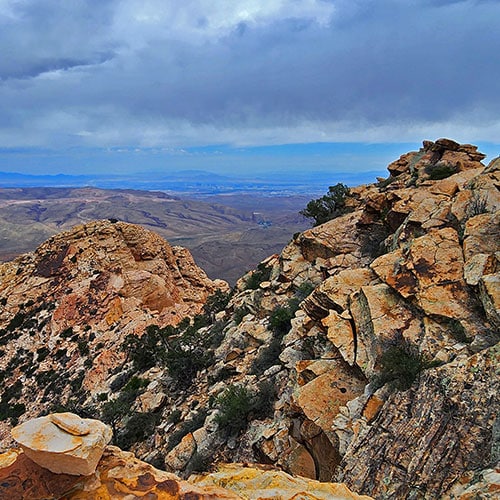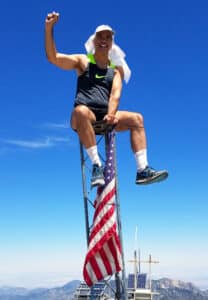
Black Velvet Peak | Rainbow Mountain Wilderness, Nevada
Overview | Black Velvet Peak | Rainbow Mountain Wilderness, Nevada
Adventure Narrative Guide and Slide Guide will appear here by early May, 2024.
Where is Black Velvet Peak?
Black Velvet Peak is one of the lesser-known Jurassic sandstone peaks in the Rainbow Mountains of Nevada. Bridge Mountain, Juniper Peak, Rainbow Mountain and Mt. Wilson to the North are more well-known. Black Velvet Peak is the fourth Jurassic peak from the Southern end of the Rainbow Mountains. From the South, the peaks are South Peak, Hollow Rock Peak, Windy Peak and then Black Velvet Peak.
Who is Able to Summit Black Velvet Peak?
If you look up “Black Velvet Peak, Nevada” on the internet, you’ll likely see pictures of highly experienced rock climbers roped to the edge of impossibly high vertical cliffs. You’re seeing pictures of the better-known route to the summit of Black Velvet Peak. The better-known, highly technical route requires advanced rock climbing skill, experience and equipment. That route begins from below and ascends the vertical East face of Black Velvet Peak.
What is the Little-Known Less Advanced Route to the Summit of Black Velvet Peak?
However, there is a little-known, less advanced route to the summit of Black Velvet Peak. This route is mostly class 2 (walking) with some brief class 3 stretches (rock scrambling, requiring use of hands to pull yourself up and over rocks).
How Complicate is This Little Known Route to the Summit of Black Velvet Peak?
This secret, less advanced route to Black Velvet Peak summit descends from the Rainbow Mountains Upper Crest Ridgeline above to the West. There are a few places where you will face some significant exposure. The route is complicated and getting off course could easily lead you to the edge of a cliff! My first time to this summit was with a couple climbers who had previously traversed the route and were familiar with the area. Be sure to watch the video and study the map and narrative guide on this page.
If you are not experienced summiting peaks like Windy Peak, Hollow Rock Peak and Juniper Peak summit these other peaks before you attempt Black Velvet Peak. If it’s your first time to Black Velvet Peak, it’s a good idea to do this summit with someone who has previously traversed this summit route.
Route Starting Point Directions | Black Velvet Peak | Rainbow Mountain Wilderness, Nevada
Take I-215 to the Charleston Blvd. Exit in Summerlin, then head upward toward Red Rock Park. Pass Red Rock Park, continuing on Hwy 159. Pass the town of Blue Diamond, then turn right onto Hwy 160 toward Pahrump. Hwy 160 will ascend upward to a high point just before the town of Mountain Springs. Around that high point park at the Mountain Springs Trailhead on your right. The trailhead has no marking and is a hard right turn off Hwy 160. There’s a yellow diamond Horse Crossing sign there that is a good marker for the turn-off. Turn off Highway 160 onto a dirt road and into an area that looks like an unimproved campground with scattered areas to park. If you are the first to arrive in the morning it’s not obvious that you are at a trailhead.
Narrative Guide | Black Velvet Peak | Rainbow Mountain Wilderness, Nevada
Adventure Narrative Guide and Slide Guide will appear here by early May, 2024.



